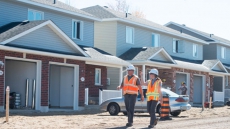Morning begins with the clattering, whirring sounds of tools and mechanical equipment ringing out across the University of British Columbia’s (UBC) campus on the edge of the Okanagan valley.
For most passing by, there isn’t much separating this construction site from any other. But for Dave Waldron, it represents a window into the future — a new affordable housing project for students, called Skeena, that is being built to an energy-efficient Passive House standard that will run without using fossil fuels.
“This really is a bold step forward,” said Waldron, UBC Okanagan’s former director of campus planning and development. “Part of the beauty of the Passive House concept is its simplicity. Essentially, what you’re doing is making a super-efficient shell compared to conventional buildings.”
Waldron was part of the team that helped bring the Skeena project to life with the help of an $18.7-million loan from the Province. When the building officially opens in September 2020, it will house 220 students on six floors, five of which will be built with a wood frame on a concrete base.
“The best way to conserve energy is to simply not need it in the first place, whether it’s for heating or cooling. With Passive House buildings, you invest in your structure as opposed to a bunch of fancy mechanical and electrical bells and whistles, which makes it really long lasting because there aren’t as many moving parts.”
Once up and running, Skeena will be equivalent to a net-zero energy-ready building. This means it will be so efficient, it could meet all its energy needs with renewable energy generation on site, such as solar or geothermal. For now, Skeena will be connected to BC Hydro’s electrical grid, which is powered almost entirely by clean and renewable energy.
“UBC is always trying to push the envelope, but not break the bank while doing it. I think that’s really important because if you just build the most advanced environmental building with no thought to cost, it’s not going to be that useful for the majority of builders.”
Waldron said the Skeena project will provide valuable learning opportunities for university researchers on energy and cost savings over time that can be applied to future efforts to reduce the university’s emissions. With buildings contributing more than 90% of campus greenhouse gases, the lessons learned with Skeena will help the university achieve its long-term goal of becoming carbon free by 2050.
“Knowledge creation and diffusion of learning — that’s a core part of what the university is. We see the campus as a ‘living lab’ that can bring insights to apply down the road in other buildings,” he said. “We’re truly building for the future with this project. We would expect these buildings to be around fifty or more years from now, so they ought to still be appropriate for the times at that point.”
UBC Okanagan has had significant progress reducing its carbon footprint. Last year, emissions on campus fell by 29% from the previous year, thanks in part to a number of university initiatives. Building controls were improved to operate better in cold weather and the district energy system that heats most of the buildings was fine tuned.
As part of the Province’s carbon-neutral government program, all public-sector organizations have to report their annual emissions, take actions to reduce them, provide plans to reduce them further and purchase carbon offsets to achieve carbon neutrality. 2018 was the ninth year in a row that B.C. achieved carbon neutrality across all public-sector operations.
For Waldron, the carbon-neutral program provides an important incentive to drive further climate action to get to the university’s goal of zero carbon.
“Eventually, that’s where we need to get to. It’s the ultimate goal — carbon neutral, you want to get there. Exactly what that looks like hasn’t been finalized yet, but UBC has taken a lot of positive steps that will help achieve that down the road.”
For now, the university will rely on offsets to reach that target. But with projects like Skeena taking shape, an emission-free future appears closer than ever before.
Quick Facts:
UBC Okanagan’s Skeena project was one of the winners of the Province’s CleanBC Net-Zero Energy-Ready Challenge.
British Columbia is the only carbon-neutral government at the provincial, territorial, state or national level in North America.
In 2018, 127 public-sector organizations – including health authorities, school districts, post-secondary institutions, Crown corporations and the provincial government – generated 749,544 tonnes of greenhouse gas emissions, representing an 8% reduction since 2010.
Public-sector carbon offsets in 2018 were sourced from projects involving energy efficiency, fuel switching and carbon sequestration.
B.C.’s emission offset portfolio has reduced approximately 6.2 million tonnes of carbon dioxide equivalent between 2010 and 2018, equal to the emissions from 2.2 million cars in one year.

